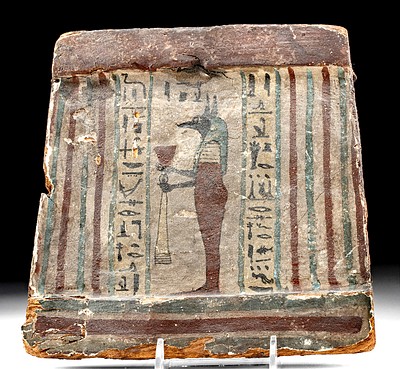20th C. African Montol Wood Female Figure
Lot 124i
About Seller
Artemis Gallery
686 S Taylor Ave, Ste 106
Louisville, CO 80027
United States
Selling antiquities, ancient and ethnographic art online since 1993, Artemis Gallery specializes in Classical Antiquities (Egyptian, Greek, Roman, Near Eastern), Asian, Pre-Columbian, African / Tribal / Oceanographic art. Our extensive inventory includes pottery, stone, metal, wood, glass and textil...Read more
Categories
Estimate:
$2,000 - $3,000
Absentee vs Live bid
Two ways to bid:
- Leave a max absentee bid and the platform will bid on your behalf up to your maximum bid during the live auction.
- Bid live during the auction and your bids will be submitted real-time to the auctioneer.
Bid Increments
| Price | Bid Increment |
|---|---|
| $0 | $25 |
| $300 | $50 |
| $1,000 | $100 |
| $2,000 | $250 |
| $5,000 | $500 |
| $10,000 | $1,000 |
| $20,000 | $2,500 |
| $50,000 | $5,000 |
| $100,000 | $10,000 |
| $200,000 | $20,000 |
About Auction
By Artemis Gallery
Aug 26, 2021
Set Reminder
2021-08-26 10:00:00
2021-08-26 10:00:00
America/New_York
Bidsquare
Bidsquare : Fine Antiquities | Asian | Ethnographic Art
https://www.bidsquare.com/auctions/artemis-gallery/fine-antiquities-asian-ethnographic-art-7366
Features classical antiquities, ancient and ethnographic art from cultures encompassing the globe. Egyptian, Greek, Roman, Etruscan, Near Eastern, Asian, Pre-Columbian, Native American, African / Tribal, Oceanic, Spanish Colonial, Russian, Fine / Visual Arts, so much more! Artemis Gallery info@artemisgallery.com
Features classical antiquities, ancient and ethnographic art from cultures encompassing the globe. Egyptian, Greek, Roman, Etruscan, Near Eastern, Asian, Pre-Columbian, Native American, African / Tribal, Oceanic, Spanish Colonial, Russian, Fine / Visual Arts, so much more! Artemis Gallery info@artemisgallery.com
- Lot Description
West Africa, Northern Nigeria, Middle Benue Valley, Montol culture, ca. 1950s CE. A fabulous anthropomorphic wooden figure in the form of a female standing on stout legs with a narrow torso and arms resting parallel to her body before terminating in rounded nubs. Flanked by sizable, tab-shaped ears with annular drill holes, her round head presents a stylized visage of two petite, pierced eyes, a flat nose, and a recessed mouth, all atop an extended, tubular neck. A risen navel and pointed breasts are featured across her lengthy body. The intriguing figure has been adorned with black pigment. Size: 4.5" W x 14.5" H (11.4 cm x 36.8 cm); 14.875" H (37.8 cm) on included custom stand.
Figures like this one traditionally are used by the Komtin Society, a group of male herbal healers in Montol culture, to assess a person's health and diagnose illnesses.
"The Montol figure does more than stand. With arms akimbo, she challenges the world. In the ballet of African iconography, head erect, lips back, feet flat upon the ground, she performs on her own terms the first position." (Robert Farris Thompson, 1999)
Provenance: private Houston, Texas, USA collection, 2015; ex-Hammill Gallery, Boston, Massachusetts, USA
All items legal to buy/sell under U.S. Statute covering cultural patrimony Code 2600, CHAPTER 14, and are guaranteed to be as described or your money back.
A Certificate of Authenticity will accompany all winning bids.
PLEASE NOTE: Due to recent increases of shipments being seized by Australian & German customs (even for items with pre-UNESCO provenance), we will no longer ship most antiquities and ancient Chinese art to Australia & Germany. For categories of items that are acceptable to ship to Australia or Germany, please contact us directly or work with your local customs brokerage firm.
Display stands not described as included/custom in the item description are for photography purposes only and will not be included with the item upon shipping.
#162966Perforations to head and fissures to verso with some loss. Expected nicks/chips, abrasions, and losses to surface, but form still clear. Liberal remains of pigment.Condition
- Shipping Info
-
All shipping is handled in-house for your convenience. Your invoice from Artemis Gallery will include shipping calculation instructions. If in doubt, please inquire BEFORE bidding for estimated shipping costs for individual items.
-
- Buyer's Premium



 EUR
EUR CAD
CAD AUD
AUD GBP
GBP MXN
MXN HKD
HKD CNY
CNY MYR
MYR SEK
SEK SGD
SGD CHF
CHF THB
THB













